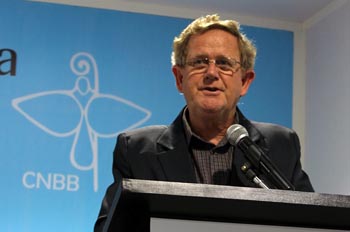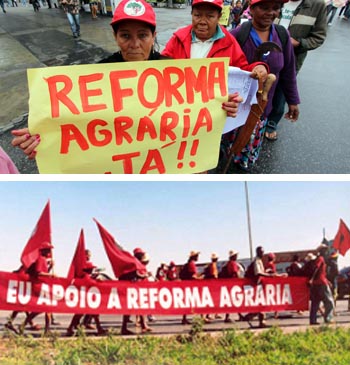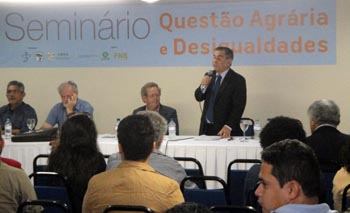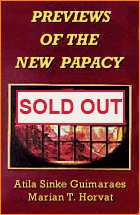International Affairs
 |
 |
 |
 |
 |
 |
 |
Echoes from Brazil
An Exhausted Left in Brazil
There is a flurry of news reports that the Left around the world is suffering a crisis of people’s support. In Brazil the situation is no different. At the end of 2014 a Seminar on the theme “The Agrarian Question and Inequalities” was held in Brasilia, promoted by the National Conference of Brazilian Bishops (CNBB).
 The speakers included a member of the federal PT government (Workers' Party) and leaders of revolutionary movements: the Central Workers Union (CUT), the Pastoral Land Commission (CPT) the Bishops Conference itself, the Landless Movement (MST), the Via Campesina, the one responsible for criminal attacks against agro-forestry research centers, etc.
The speakers included a member of the federal PT government (Workers' Party) and leaders of revolutionary movements: the Central Workers Union (CUT), the Pastoral Land Commission (CPT) the Bishops Conference itself, the Landless Movement (MST), the Via Campesina, the one responsible for criminal attacks against agro-forestry research centers, etc.
Dominated for decades by Liberation Theology, the CNBB has been striving to promote the class struggle in Brazil. The Brazilian Bishops are paying a high price for this orientation: an inexorable loss of credibility and influence, demonstrated by the small number of participants at the Seminar: The hall held only the leaders of the above-mentioned revolutionary movements and a small audience of some 80 people, despite being open to the public.
The Seminar consisted of lectures followed by two days of discussions. One of the principal issues addressed was the current conservative wave in Brazil and the world, which is creating difficulties for the implementation of socialist reforms. It was openly stated that the Left is losing ground in Brazil and cannot advance the Agrarian Reform it is pushing.
 Representing the Brazilian Bishops, Msgr. William Werlang, Bishop of Ipameri (Goiás), known for its leftist orientation, opened the event. He lamented that Agrarian Reform was absent from the discussion in the last elections, a sign of the failure of that fight. To spur the Left, he called for “a radical change of the current model.” A plan filled with patches will not suffice, he affirmed. What is needed is a “radical Agrarian Reform made by the people.”
Representing the Brazilian Bishops, Msgr. William Werlang, Bishop of Ipameri (Goiás), known for its leftist orientation, opened the event. He lamented that Agrarian Reform was absent from the discussion in the last elections, a sign of the failure of that fight. To spur the Left, he called for “a radical change of the current model.” A plan filled with patches will not suffice, he affirmed. What is needed is a “radical Agrarian Reform made by the people.”
The Prelate took advantage of the opportunity to praise the meeting of Pope Francis with the revolutionary “social movements” that took place in Rome last October. That landmark meeting, he noted, had “something prophetic” about it.
The second speaker, Landless Movement leader João Pedro Stedile, a notorious communist, complained that the Left was unable to mobilize society (the last general strike was over 25 years ago in 1988) and that the classical model of Agrarian Reform had become impossible because “our team is weak.”
The solution proposed by the communist leader was to strengthen the alliance with ecclesiastical Progressivism since the Church “has the vanguard position in the class struggle issue” in Brazil. He closed his speech reaffirming the Church's signal role in this class struggle, adding that Pope Francis “is a revolutionary.”
The third speaker was Workers' Party representative Gilberto Carvalho, current Secretary of Brazil’s President. He complained about the difficulties encountered by President Dilma Rousseff in moving the country to the Left, such as the growing conservative bloc in Congress and the constant pressure coming from the Right. Such obstacles prevented the adoption of the political reform plan, which included the establishment of a “direct democracy” through “councils of the people” (real soviets, which would, thus, create a new dictatorial power in Brazil).
 The Workers Party representative lamented that today it is “modern” and “in style” to be conservative, to “be on the Right.” The only way out for the Left, he noted, is to activate the “social movements” and this is only possible with the help of the Church.
The Workers Party representative lamented that today it is “modern” and “in style” to be conservative, to “be on the Right.” The only way out for the Left, he noted, is to activate the “social movements” and this is only possible with the help of the Church.
The big problem, he added, is that while the Church is experiencing a “new springtime” with Francis I, the dioceses and parishes are still behind the times. Therefore, there is no short-term perspective for the “social movements” to achieve their goals.
“The social movements must continue to put pressure on the government to counteract pressure from the Right. They must mobilize and work together for this People’s Agrarian Reform bill, so that we truly have a government with interlinking forces that can help the people permanently,” he said.
Secretary Carvalho reaffirmed the idea that Pope Francis is “a new hope and a prophet.” He stressed: “The Church is the inspiration for us all.”
In the discussions following the conference, it became apparent that along with the decline of the Left in political and social issues, there is a return to conservatism in the religious sphere. Bishop Werlang emphasized that “it is really very difficult” to stop this wave. Today, priests are more conservative, he noted. “The conservative seminaries and monasteries are filled with vocations.”
Another priest confirmed this phenomenon of waning Progressivism in the Church. “Pope Francis is pulling a stuck wagon alone. We cannot mobilize the faithful to take revolutionary positions.”
The Seminar participants showed little confidence in prospects for activating the leftist movements. One after another announced that the only hope was the pontificate of Pope Francis. They take heart in thinking that, under the action of this pontificate, the Left can be encouraged and, under the guidance of the Church, impose its agenda on Brazil.
At the end of the Seminar, Landless Movement leader Stédile proposed future actions such as road blocks, strikes and street demonstrations. With aims of spurring the tired horse, he concluded by exclaiming: “Welcome to the class struggle!”
Before this impasse, what will the Left in Brazil do? Will there be some surprise?


Bishop Werlang, preaching a “radical popular Agrarian Reform.”
Dominated for decades by Liberation Theology, the CNBB has been striving to promote the class struggle in Brazil. The Brazilian Bishops are paying a high price for this orientation: an inexorable loss of credibility and influence, demonstrated by the small number of participants at the Seminar: The hall held only the leaders of the above-mentioned revolutionary movements and a small audience of some 80 people, despite being open to the public.
The Seminar consisted of lectures followed by two days of discussions. One of the principal issues addressed was the current conservative wave in Brazil and the world, which is creating difficulties for the implementation of socialist reforms. It was openly stated that the Left is losing ground in Brazil and cannot advance the Agrarian Reform it is pushing.

Today only a few hardened revolutionaries show up for Agrarian Reform demonstrations
The Prelate took advantage of the opportunity to praise the meeting of Pope Francis with the revolutionary “social movements” that took place in Rome last October. That landmark meeting, he noted, had “something prophetic” about it.
The second speaker, Landless Movement leader João Pedro Stedile, a notorious communist, complained that the Left was unable to mobilize society (the last general strike was over 25 years ago in 1988) and that the classical model of Agrarian Reform had become impossible because “our team is weak.”
The solution proposed by the communist leader was to strengthen the alliance with ecclesiastical Progressivism since the Church “has the vanguard position in the class struggle issue” in Brazil. He closed his speech reaffirming the Church's signal role in this class struggle, adding that Pope Francis “is a revolutionary.”
The third speaker was Workers' Party representative Gilberto Carvalho, current Secretary of Brazil’s President. He complained about the difficulties encountered by President Dilma Rousseff in moving the country to the Left, such as the growing conservative bloc in Congress and the constant pressure coming from the Right. Such obstacles prevented the adoption of the political reform plan, which included the establishment of a “direct democracy” through “councils of the people” (real soviets, which would, thus, create a new dictatorial power in Brazil).

Carvalho, the President Secretary, complains to the sparse audience that it is "in style to be on the Right"
The big problem, he added, is that while the Church is experiencing a “new springtime” with Francis I, the dioceses and parishes are still behind the times. Therefore, there is no short-term perspective for the “social movements” to achieve their goals.
“The social movements must continue to put pressure on the government to counteract pressure from the Right. They must mobilize and work together for this People’s Agrarian Reform bill, so that we truly have a government with interlinking forces that can help the people permanently,” he said.
Secretary Carvalho reaffirmed the idea that Pope Francis is “a new hope and a prophet.” He stressed: “The Church is the inspiration for us all.”
In the discussions following the conference, it became apparent that along with the decline of the Left in political and social issues, there is a return to conservatism in the religious sphere. Bishop Werlang emphasized that “it is really very difficult” to stop this wave. Today, priests are more conservative, he noted. “The conservative seminaries and monasteries are filled with vocations.”
Another priest confirmed this phenomenon of waning Progressivism in the Church. “Pope Francis is pulling a stuck wagon alone. We cannot mobilize the faithful to take revolutionary positions.”
The Seminar participants showed little confidence in prospects for activating the leftist movements. One after another announced that the only hope was the pontificate of Pope Francis. They take heart in thinking that, under the action of this pontificate, the Left can be encouraged and, under the guidance of the Church, impose its agenda on Brazil.
At the end of the Seminar, Landless Movement leader Stédile proposed future actions such as road blocks, strikes and street demonstrations. With aims of spurring the tired horse, he concluded by exclaiming: “Welcome to the class struggle!”
Before this impasse, what will the Left in Brazil do? Will there be some surprise?

Posted February 27, 2015
______________________
______________________











